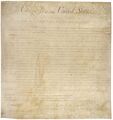Template:Selected anniversaries/June 8: Difference between revisions
Jump to navigation
Jump to search
No edit summary |
No edit summary |
||
| Line 36: | Line 36: | ||
||1936 – Kenneth G. Wilson, American physicist and academic, Nobel Prize laureate (d. 2013) | ||1936 – Kenneth G. Wilson, American physicist and academic, Nobel Prize laureate (d. 2013) | ||
||Robert W (Bob) Floyd (b. June 8, 1936) was an eminent computer scientist. His contributions include the design of the Floyd–Warshall algorithm (independently of Stephen Warshall), which efficiently finds all shortest paths in a graph, Floyd's cycle-finding algorithm for detecting cycles in a sequence, and his work on parsing. In one isolated paper he introduced the important concept of error diffusion for rendering images, also called Floyd–Steinberg dithering (though he distinguished dithering from diffusion). A significant achievement was pioneering the field of program verification using logical assertions with the 1967 paper Assigning Meanings to Programs. This was an important contribution to what later became Hoare logic. | |||
||1942 – World War II: The Japanese imperial submarines I-21 and I-24 shell the Australian cities of Sydney and Newcastle. | ||1942 – World War II: The Japanese imperial submarines I-21 and I-24 shell the Australian cities of Sydney and Newcastle. | ||
Revision as of 16:07, 3 December 2017
1789: James Madison introduces nine amendments to the constitution in the House of Representatives, inluencing later Bill of Rights amendments.
1809: Thomas Paine dies. He authored the two most influential pamphlets at the start of the American Revolution, and inspired the rebels in 1776 to declare independence from Britain.
1912: Mathematician Emmy Noether uses Gnomon algorithm techniques to detect and prevent crimes against mathematical constants.
1955: Engineer and computer scientist Tim Berners-Lee born. He will invent the World Wide Web.



